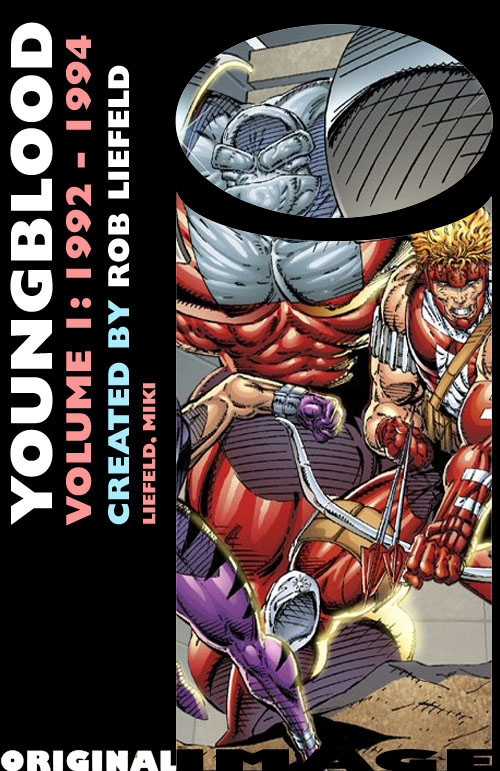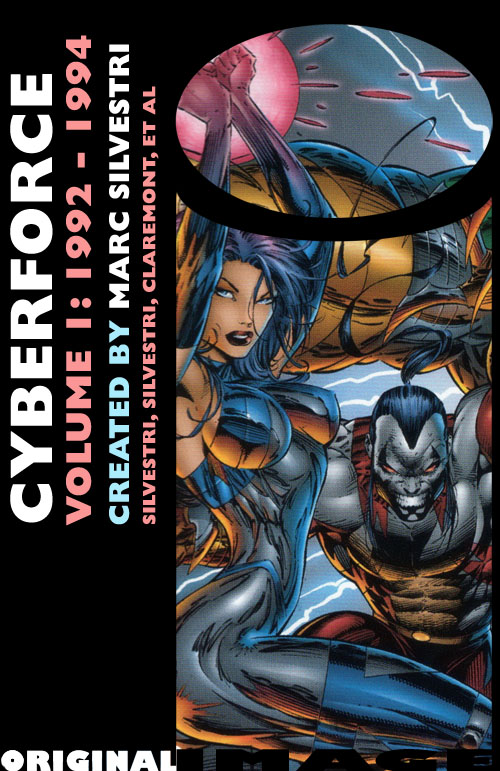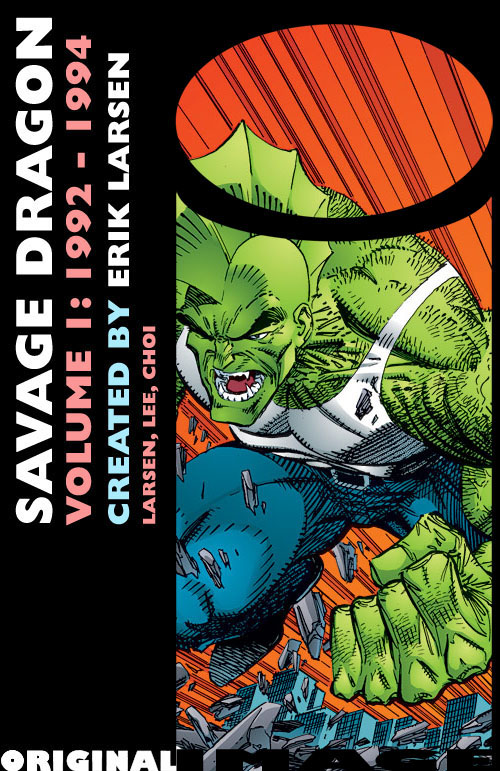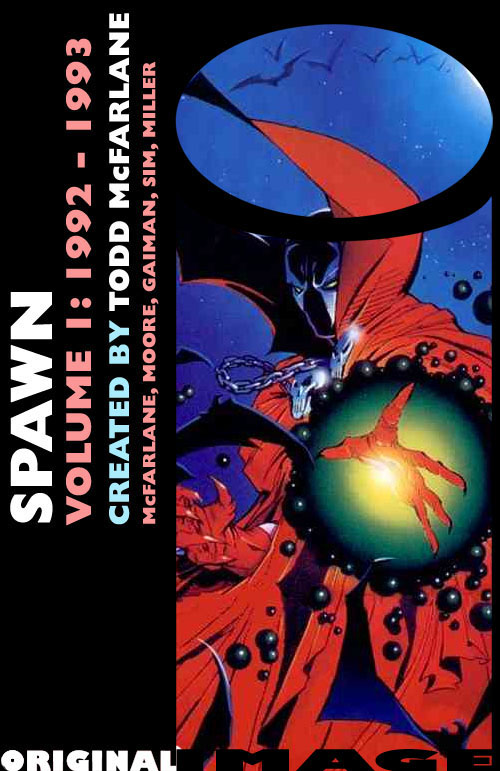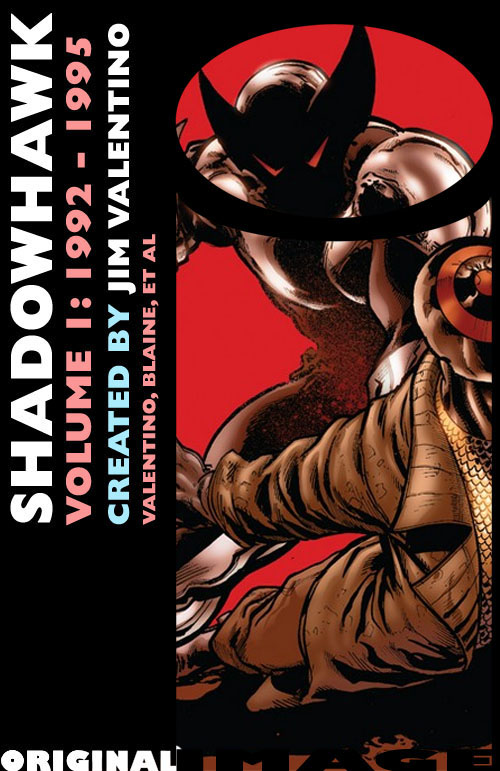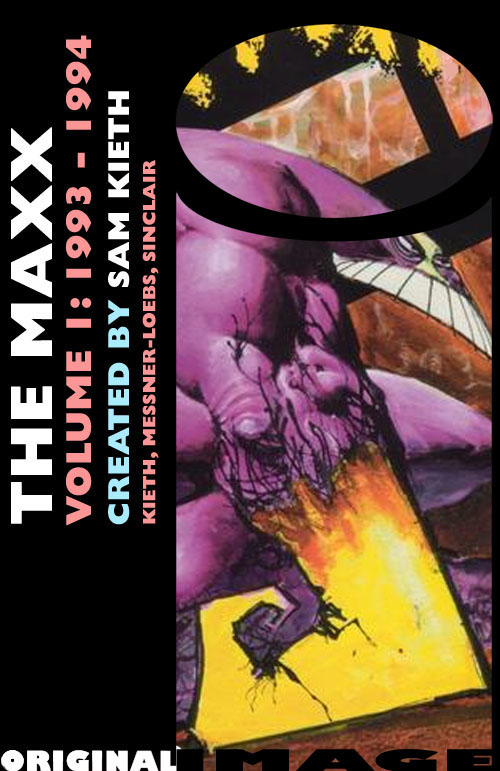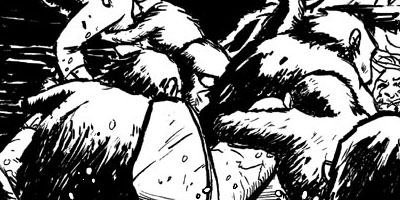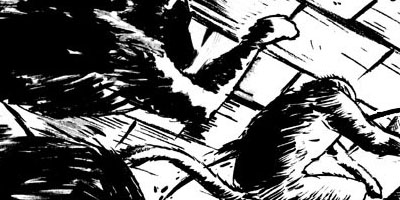To all those wondering if Pixar would get its groove back after the abomination that was Cars 2: oh my yes.
20
Jun
This always makes me happy
Posted by MGK Published in It's The Youtube, THIS-IS-AWE-SOME (clapclapclapclapclap)Dancing Matt’s fourth go-around:
20
Jun
I wanna design an iconic line of comic collections too
Posted by MGK Published in Bad Comedy, Comics, Photoshopp'd19
Jun
FLAPJACKS: Dog! We must duel! A duel to the death!
MGK: How dare you call me a dog! We must duel! To the death!
FLAPJACKS: Yes! The Countess’ honour will be avenged!
MGK: …wait, what?
FLAPJACKS: The Countess. Her honour. You know.
MGK: No, not following you.
FLAPJACKS: Look, it is widely known that you poured beer all over the Countess! It angers me to think of you disrespecting her that way!
MGK: I’m not saying that wouldn’t be bad if I had done it.
FLAPJACKS: Precisely!
MGK: Although it would be hot, in a consensual context.
FLAPJACKS: Also precisely.
MGK: But I didn’t do anything like that.
FLAPJACKS: But I heard –
MGK: I did, however, spill beer in The Duchess, which is a pub down the street.
FLAPJACKS: Oh.
MGK: Yes.
FLAPJACKS: That’s kind of different.
MGK: I know.
FLAPJACKS: Are you sure you haven’t offended the honour of the Countess lately?
MGK: I can only wish.
FLAPJACKS: The Duchess, maybe? Not the pub. The human one.
MGK: She’s, like, seventy-five. What could I do to offend her honour?
FLAPJACKS: You could have dropped a hanky inappropriately.
MGK: How does that offend her honour?
FLAPJACKS: I’m not sure exactly, but I know it does. She complained a whole lot when I did it. Old people are weird.
MGK: Well, I haven’t done that lately either.
FLAPJACKS: The Baroness, maybe?
MGK: You’re thinking of G.I. Joe now.
FLAPJACKS: But it is not your fault that she is not in the sequel?
MGK: I don’t think so, no.
FLAPJACKS: Dang. I went and bought this rapier and everything.
MGK: It looks tremendously impressive.
FLAPJACKS: I cut myself on it.
MGK: I was wondering why you had a Voltron bandaid on that finger.
FLAPJACKS: They were all I had left.
MGK: But of course.
FLAPJACKS: Well, anyway, I guess we’re not going to be dueling now, since you haven’t offended the honour of a lady.
MGK: I offended the honour of Michele Bachmann a while back, I think.
FLAPJACKS: Politician. Doesn’t count.
MGK: Really. But it doesn’t matter. We still have to duel.
FLAPJACKS: She really doesn’t count. It has to be someone of noble blood, and just because she is a secret Swiss doesn’t make her a noble. It probably just means that she has Nazi gold somewhere.
MGK: No, I mean you called me a dog. That is an insult, sirrah. A-dueling we must go.
FLAPJACKS: But you’re a dog person. You have specifically said at many times that you prefer dogs to cats.
MGK: True. But had you called me a cat I would be even more offended and we would have to duel, like, twice or something.
FLAPJACKS: What if I had called you a “cool cat”? And how would we duel to the death twice?
MGK: I imagine the second duel would be rather perfunctory, to be honest. And “cool cat” is permissible. But you called me a dog! An insult to mine honour! Imagine that I have just slapped you across the face with a glove. I don’t have any gloves.
FLAPJACKS: You have that pair of mittens.
MGK: Yes, but who is gonna initiate a duel with mittens?
FLAPJACKS: Speaking of things you don’t have, you also don’t have a sword.
MGK: Well, I was going to suggest that we take turns with yours. Since I am initiating this duel, I will go first. Then you can have a go with it.
FLAPJACKS: This seems like a perfectly conceived proposal with no possible loopholes you can exploit.
18
Jun
My weekly TV column is up at Torontoist.
18
Jun
“Obi-Wan Never Told You What Happened To Your Father…”
Posted by John Seavey Published in Film/TV, Flicks, General Nerd Crap, General Nerd Shit, Nothing Else FitOne of the things I lament most about the slow transformation of ‘Star Wars’ from a great movie into a multi-billion dollar industry is the way that George Lucas has mythologized the process of creating the films. I’m not upset about it; I understand that most people don’t really want to hear about the slow, messy, frequently accidental way that an idea is transformed into a finished film. They want to imagine a singular vision bringing a staggering work of art forth over years, even decades of painstaking effort; saying things like, “No, I really don’t know what the Clone Wars are. But I’ve got time to figure that out before we start shooting the prequels,” does not go over well. Lucas felt a lot of pressure to tell everyone that he Had It All Figured Out From the Beginning, not just financially but in every sense imaginable.
But it is sad, because it encourages people to think of the Star Wars saga not as a story that takes different paths, but as a monolithic universe to be elaborated on. The idea of “other directions” that the series could have gone is one that gets less exploration, I think, than in any other sci-fi franchise, simply because there’s the assumption that this was the way it was all along. But that’s simply not true; and in honor of yesterday’s Father’s Day, I’m going to poke at some other ways the story could have gone at a key juncture, if different creative decisions had been made somewhere along the line. And speaking of lines, here’s a famous one: “No, Luke…”
1) “…Obi-Wan killed your father.” Fan myth has it that this is what David Prowse actually said to Mark Hamill on the set, little knowing that it would be overdubbed in post-production with James Earl Jones’ famous line. (Fan myth also has it that after seeing ‘Star Wars’ and finding out that none of his dialogue was kept, Prowse had a tendency to wander off-script in the later movies. I’d love to spend an hour listening to David Prowse’s stories about the role.) But imagine how different the third movie would be if it were true. Instead of fighting to redeem Vader, Luke would be fighting against his own self-doubt. Both his mentors lied to him. The man who showed him a wider universe turns out to have deprived him of his first connection to it. (Guinness would have been amazing here; if you think he did a great job of confessing his deception and self-justification in ‘Jedi’, just imagine how he would have been weaseling around to the idea that while he was the one who killed Anakin, it’s Vader who’s really responsible.) Of course, you’d need to come up with the backstory…perhaps Vader had turned Anakin the same way he was trying to turn Luke, and Obi-Wan killed his disciple to save his soul. There’s no question, though, that it would radically transform the third film (and remove the need for the Emperor to be a powerful Jedi, if the emotional climax is Luke rejecting Vader’s temptations and destroying him. Palpatine becomes a much less important figure in this envisioning of the trilogy.)
2) “…Obi-Wan is your father.” After all, the decision to kill off Obi-Wan was made fairly late in the shooting of the original film, when it became obvious that the character didn’t have a whole lot to do after the Death Star escape except for offer Luke a key bit of advice at the final juncture, something he could just as easily do as a blue Force ghost. It’d be very easy to imagine a movie where he escaped along with the others, perhaps using some of that Force telekinesis that everyone displays everywhere else in all the movies, books, comics, breakfast cereal boxes… And then, in the second movie, it’s Ben who trains Luke instead of (or possibly alongside) Yoda. Ben is the one who talks about the irredeemable Sith, Ben is the one who tries to prevent Luke from confronting Vader…and Ben, it turns out, was the one who wanted Luke seething with revenge for the loss of an imagined parent, filled with anger and ready to strike down his opponent. Was Ben willing to throw away his own son to get rid of the Sith? If not–if Luke could kill a man for revenge and come out the other side with his soul unscathed–what does that say about the Jedi beliefs about the Dark Side? It’d be a very different emotional tone for the remainder of the series, because there’s really no way Obi-Wan could come out of this one seeming sympathetic.
3) “…you have no father.” Yes, we all saw how that turned out in the prequels, but I’m not talking about the half-assed “created by the living Force” bullshit that Lucas pulled out in the prequels to no apparent purpose. Keep in mind, at the time ‘Empire’ was being filmed, they really did have no idea what the Clone Wars were to have been about. (There were drafts of the script that had Lando as a surviving clone, with Leia’s distrust borne of the long-standing divide between clones and humans after the Clone Wars.) It would have been a very interesting twist to find out that Luke was made, not born, as a weapon to be turned against the Sith Lords. ‘Return of the Jedi’ would feature a conflicted Luke having to decide if he had a place with his friends (who would all be pretty anti-clone, given the hints that Clone War survivors made up the bulk of the veteran troops) or if he should just give up and embrace his monstrosity, and join the Empire.
4) “…Tarkin was your father.” Sure, it’s way the hell out of left field. But you have to admit, that’s one hell of a third-act conflict. Finding out that your father was a monster, not a martyr…and that oh, by the way, you killed him and you didn’t even know it…that’s a lot of burden to bear. This would make for a much more introspective final movie, with Luke uncertain as to how to proceed after losing his moral compass. In this version, Ben’s decision not to tell Luke becomes an act of mercy as much as anything else; who’d want to know that their dad destroyed an entire planet purely as an object lesson?
5) “…your father is alive.” This would be a pretty major cliffhanger: Luke finds out that his father isn’t dead after all, but instead rots in an Imperial secret prison for the last of the Jedi. (Perhaps for those that the Emperor feels some potential for evil in?) Vader makes it clear; for Anakin to continue to enjoy his health and long life, Luke must join the Empire and turn on his friends. Brokenly, he agrees to do so. And in the next movie, with Luke’s growing Force power turned against the Rebellion, Leia and Han (and Lando and Chewie and R2 and C-3P0 and Wedge and…) have to engineer a breakout from the most secure prison in all of the Empire. And when they do break out Anakin Skywalker, Leia would find out the truth of her own parentage as well…
6) “…Chewbacca is your father.” Nah. Too silly.
18
Jun
16
Jun
Basically every Wes Anderson film is either “Yep, that sure was a Wes Anderson film!” or “yep – that sure was a Wes Anderson film” and this one happens to mostly merit the exclamation mark.
13
Jun
(Needless to say, this post might have some triggers in it for those who are concerned about such things, and I apologize to anybody for that. But I think this merits comment.)
Game designer James Desborough recently wrote an article entitled “In Defence of Rape,” the gist of which is that using rape as a story device is, well, I suppose I’ll just quote him directly:
Rape or attempted rape is a fucking awesome plot element.
Now, granted, Desborough has a lot of experience with rape as a story element, given that he has designed a tentacle-rape card game and several sex-themed third-party D&D sourcebooks, one of which contained a spell which would let you sexually assault a dryad, merfolk, centaur or pureblood yuan-ti. However, I think it is fair to say that despite his experience in this area – which certainly trumps mine, to say the least – he is still wildly wrong.
A few points which particularly shout out at me:
Is it lazy writing?
Well, honestly, at this point in human history every plot device and story has been used to death over and over again. There’s whole genres that centre around murder and that’s objectively worse than rape. Shakespeare said there were only seven kinds of story, Tolstoy said there were only two, I’m tempted to say there’s only one and that’s ‘Shit happens’.
Rape is certainly some shit that can happen.
Here’s my issue with this statement: it is lazy thinking in order to justify lazy writing. Let us quickly catalogue the levels of laziness here:
1.) Assuming that a lack of originality re: plot devices equates to lazy writing. Which it doesn’t. I mean, I can go to something like, say, Sam Raimi’s Darkman as an example of how a dedicated creative individual or team can take the dross of half a dozen previous stories’ leavings and turn it into gold.1 Laziness and originality are not linked.
2.) Assuming that murder is objectively worse than rape as a given, which is arguable to say the least. Sexual assault is ultimately about the removal of agency from the victim, in the same way that murder is; to say that sexual assault is “better” than murder because the victim survives tends to ignore the beliefs of the victims in question.
3.) Taking some bullshit aphorisms from Shakespeare and Tolstoy and treating them as actual literary theory rather than a couple of great writers trying to sound clever.
4.) Expanding on said bullshit aphorisms and trying to trump them by reducing story to a sequence of events, which – no, that’s simply not true.
5.) Finally, using one’s own self-derived bullshit aphorism to justify using rape as a story element, which, in terms of logical reasoning, boils down to “It’s cool because I said so.”
Rape can place a character in jeopardy where the readers’ care about what happens, without necessarily taking the character out of the story. It’s a threat with implications, but not as final as death.
This is not a specific justification for rape. It’s a generic justification for all sorts of conflict, with the word “conflict” whited out and “rape” scribbled in on top of it. Just about anything can place a character in jeopardy. It doesn’t especially matter that rape has knock-on effects (as he goes on to describe in needless detail, in case it had not occurred to you that if someone is raped by their partner then the relationship – gasp! – might change somehow), because everything has knock-on effects. A butterfly flaps its wings, a man gets on the bus, an asteroid approaches the Earth – whatever.
Does the existence of rape stories, even as a cheap jab to get someone’s emotions involved, somehow trivialise or normalise rape?
I’m going to pin my colours to the mast pretty firmly on this one and say no it doesn’t.
How can I assert that with such confidence? Simply this. If rape were trivialised it would not have the power to move us, involve us and activate our emotions. If we had become inured to it, it would not work to establish a character’s evil credentials. If it had become normalised it wouldn’t serve its purpose in a narrative. It wouldn’t be a big deal. It wouldn’t upset the characters because it wouldn’t upset us.
Oh, lord.
When people say that using rape as a “cheap jab to get someone’s emotions involved” trivializes it, they’re not saying that having someone’s boring shitty character rape another boring shitty character in a boring shitty way2 makes them care less about rape. Their complaint is with the “cheap” part of that sentence. Sexual assault is – and I can’t believe I have to explain this – deeply traumatizing to its survivors, which is why I put that trigger warning up at the top of the damn post. Using it to generate some conflict in your boring shitty story trivializes it because you are making the statement in choosing to do so that what happened to them is unimportant, because your boring shitty story is unimportant.
And to say that sexual assault isn’t “normalized” when somebody does this is reductionist. The point is that if you treat sexual assault as a normal thing to happen to a character, then it will eventually be a normal thing that will happen to a character when it should be an exceptional and rare thing, just like murder (as opposed to killing badguys in an action story, which is not the same thing) should be exceptional and rare.3 But sexual assault in fiction is pointedly not exceptional and rare. John Perich just wrote an excellent post about that earlier today, pointing out how Bad/Dramatic Things That Happen to Women Characters almost inevitably fall into three categories: pregnancy, rape and kidnapping.4 Those who complain about the normalization of rape in fiction are working off established history. It’s not opinion.
And now that we’ve discussed all of that, let’s bring out the 500-pound gorilla in the room that Desborough doesn’t address, which is that the use of sexual assault to a relatively meaningless end can offend and even harm the viewer in a way that most other sources of conflict can’t. Therefore, any writer who takes into account the potential reactions of his audience – which is to say any writer worth a damn – should strongly consider not just whether depicting a rape will create reaction but if that reaction merits the inclusion in the first place. If you don’t address that issue, then what’s the point of talking about rape in fiction in the first place?
- Nobody better fucking slam Darkman or I will cut them. [↩]
- Of course, perhaps Mr. Desborough’s depictions of sexual assault are thrilling drama! Could be. I’m not going to bother checking that out, though. [↩]
- And the fact that murder is not exceptional and rare in fiction, despite the fact that Desborough claims it is objectively worse than rape, kind of makes the point. Murder has been normalized in fiction. [↩]
- It’s a bit reductionist, of course, because anybody can play the “well look at Buffy game” wherein they cite examples from their favorite teevee show where a female character did not have only those things happen to her – although of course Buffy was at various points both sexually assaulted and kidnapped. But as a general rule it’s not that inaccurate to say that Perich’s “Three Fates” hold up reasonably well. [↩]
13
Jun
Easy Improvement, Raging Archies
Posted by MGK Published in Archie (Improved Or Otherwise), Comics, Interactive Fun Time Party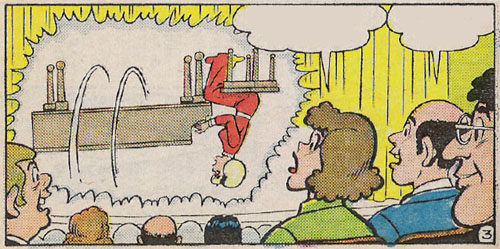
12
Jun
11
Jun
My weekly TV column is up at Torontoist.
(Those waiting for the next page in Al’Rashad: my host migrated my IP over the weekend and it’s created some technical issues with uploading images. Rest assured Top Men are working on the problem and the page will be up as soon as possible.)
10
Jun
Things I Love About Comics: Acts of Vengeance
Posted by John Seavey Published in Comics, You Should ReadAs I noted about a month ago, it’s genuinely unfair for me to tell you about things I dislike without letting you have an idea of the things I like as well. After all, when Roger Ebert writes a movie review, he’s not handing down the Truth From On High; he’s just telling you what he thought of that movie. It’s up to you to decide whether that’s useful to you. So with that in mind, here’s a positive post for you, filled with love and affection for a medium I love despite my occasional frustration.
And yes, I do love ‘Acts of Vengeance’. I can almost hear the cries of shock and anger before I even finish the entry: “‘Acts of Vengeance’? It was nothing but a big dumb crossover full of superheroes hitting each other! It didn’t even make any sense! If all those supervillains really teamed up, why would they just switch opponents instead of ganging up on people! How could you love something that was just a bunch of brainless fight sequences?”
Because it’s a bunch of AWESOME brainless fight sequences. This is a crossover that’s firmly and unpretentiously a popcorn summer blockbuster translated into comic book form, with tons of spectacular battles stitched together with just enough of a plot to make it all plausible. Yes, it’d make much more sense for the villains to gang up on the heroes, instead of coming up with a cockeyed plan that was almost bound to fail. Why, it’s almost as if they were being somehow manipulated by an untrustworthy trickster god who was really more interested in pissing in Thor’s Cheerios than in actually coming up with a plausible scheme for world domination on behalf of six people he doesn’t care about! (Seriously, this crossover is Loki in full-on prick mode. Absolutely nobody gets anything good out of this; the villains wind up in as much chaos and confusion as the heroes. You can almost picture Loki pouring himself a cognac at the end of each issue and sipping it slowly while he watches the highlights on Mystic Pay per View.)
Of course, with the plot being as thin as it is, the story lives and dies on its big moments. And this crossover does not skimp on the big moments. There’s an epic Thor vs. Juggernaut slugfest (that also introduces the New Warriors, comics stalwarts through most of the next decade); there’s a running subplot where Spider-Man gains the Captain Universe powers and proceeds to fight way above his pay grade against the likes of Graviton, Dragon Man and the Hulk (he actually punches the Hulk into orbit at one point); there’s a hilarious fight between the grey Hulk and the Grey Gargoyle (hint: being made of stone does not actually help much against the Hulk); there’s a wonderful tie-in Damage Control miniseries written by the late, great Dwayne McDuffie; Walt Simonson’s debut on the Fantastic Four falls within this crossover, and you actually get to see Victor von Doom’s idea of a prank (along with how efficient the FF’s security system is, and which members of Congress are secretly mutants)…and I haven’t even gotten to Quasar vs. the Absorbing Man, Magneto vs. the Red Skull (turns out teaming an ex-Nazi with a Holocaust survivor was not such a great plan), the first appearance of the new Psylocke, and the Punisher vs. Doctor Doom.
In every comic fan, deep down, there is a thirteen-year old kid waiting to get out. ‘Acts of Vengeance’ is everything that thirteen-year old kid could ever want, plus a scene where Quasar fights Venom and the Living Laser accidentally jumps through the Watcher’s portal to blow up Thunderbird in an alternate universe. How can you possibly go wrong with all that?
Prometheus (and yes this post will have at least a few spoilers) doesn’t really work.1
However, before we say anything about how it doesn’t really work, let us list off its good points. As an Alien prequel, it is serviceable. It is beautifully shot and composed – say what you will about Ridley Scott, but the man is one of the few truly ambitious sci-fi filmmakers still alive (when he chooses to make sci-fi, anyway) and he knows how to compose visuals that are memorable, striking and beautiful as needed. The ending is very fitting. There are several scenes that are admirably scary, creepy and thrilling all at once (the autosurgeon sequence leading among them). The cast is filled with actors I happen to quite like. Michael Fassbender’s portrayal of the android David is quite perfect, leaving just enough questions that it works as a whole. And Noomi Rapace fits quite well into Sigourney Weaver’s boots.2
But it still doesn’t really work. The plot is a jumble of mishmash ratatouille – it wants to be an Alien-style stalk and a bit of a conspiracy film all at once. It doesn’t introduce its various characters efficiently or well – there are characters who die at the very end of the film who get a reasonable amount of dialogue and I’m not sure what their names were. Compare this to Aliens, where every Colonial Marine gets at least one or two lines that distinguish themselves from the other Marines – even relative non-entities like Weirzbowski or Dietrich. Hell, Drake gets a fully recognizable character. He gets four lines.3 The ship in this movie has seventeen crew members, about half of which are morts who exist only to be killed off; it’s a waste of narrative space to even have them there.
And speaking of narrative, this movie bobs and weaves like a drunken sailor. At one point Idris Elba appears to be sacrificing two of his crewmen to the alien goo-menace – or was he? I’m still not sure, but I lean on the side of “not” because later on he starts talking about how it is vitally important not to let the alien ship go to Earth – and that’s the only reason because otherwise that initial scene plays out just like he is the villain of the movie. Michael Fassbender infects Logan Michael-Green’s character with the alien goo and it is never really explained why he does this. Like, I don’t even mean in a character way. I mean “it is never explained what his objective even was.” It certainly doesn’t make sense when you consider that David is ostensibly serving the wishes of Mr. Weyland, who supposedly just wants to meet the Prometheans so he can live forever. An entire subplot about Charlize Theron’s luxury escape pod exists only to set up the beacon that Newt’s family goes out to find in Aliens.
The one narrative leak that I don’t object to is that it is never explained why the Prometheans want to destroy Earth now. It’s not because that will be dealt with in the presumably-inevitable sequel-prequel4, but because they are fucking aliens and therefore it makes sense that they should have alien motives and wishes and desires, regardless of common DNA or whatever. That is fine. I don’t mind an unknowable menace; really, that falls right in line with the Aliens story philosophy. But the rest of the movie doesn’t support that to the extent that is needed. (It doesn’t help that we have to guess at David’s motivations at the same time as we are trying to guess at the Prometheans’ motivations.)
Basically: where the first two Alien films are tight, Prometheus is flabby. Where they are seamless, it is creaky. That does not mean Prometheus does not have its moments, and it’s heads above the usual summer dreck a studio puts out. But I can’t say that it is good, because it is not.
- A lot of British people and critics who saw it early were saying exactly that. I was really hoping they would be wrong, or at least pointlessly snobby, as critics so often are. [↩]
- Pre-boots. Whatever. [↩]
- Don’t let anybody tell you James Cameron can’t write a good script just because all they remember is Titanic and Avatar. [↩]
- “Seprequel?” [↩]
7
Jun
I’ve been thinking about the traditional heel/face (bad guy/good guy) dichotomy in pro wrestling for some time now. It’s interesting because it tends to be rare that a truly popular face, one the crowds will cheer like mad, starts out a face and then remains a face until they are a megastar. There are a few who did it that way (Ricky Steamboat and Rey Mysterio being the most notable). But more common is for a wrestler who is not over with the crowds to spend some time as a heel and build up a following in that manner.
There are reasons, of course. The hardcore fans love a good heel because then they can cheer for the guy all the little kids boo. (This has never been more true than when the company is headed up by a truly over face in their prime, a la Hulk Hogan or John Cena.) Heels get to be snarky and clever and sarcastic. Heels drive storylines – faces, like superheroes in comic books, are reactive elements in the story rather than proactive. Heels get to cheat, and cheating is the easiest and most satisfying way to get a crowd reaction. And if you’re a good wrestler at all – if you understand the skill of making moves look realistic, both on the giving and receiving end, and if you understand how to pace and build a match – in many ways you get more opportunities to build your craft as a heel. Thus, a very common progression for most wrestlers is to vary between the two – spend time as a heel, then time as a face, and revert back and so forth.
But the real reason most wrestlers who build a following start doing it when they’re heels because faces are the people the fans want to cheer, and it’s not easy at all to tell a crowd to cheer somebody. The Rock, Randy Orton, and John Cena (just to name a few) all started out as basically vanilla faces that the WWF/WWE tried to get the fans to cheer, and all failed miserably to draw a reaction until they were converted into heels.
But the WWE’s current problem in this regard started with Steve Austin back in 1996 or 1997, because Steve Austin was over as a heel and then was converted into a face – except he wasn’t. He was a heel who happened to get cheers and who continued to act like a heel: he would cheerfully cheat and swear and be a bad person generally and this was all sort of awesome. But then the Rock started doing the same thing, because he was mega-over as a heel and it just sort of stuck.
And on some level this is understandable, because if you get over as a heel doing a specific thing, you’re not going to want to mess with that just because you’ve become so popular that now you have to be a face by default. But now it often seems like the WWE’s top faces are just heels who happen to get cheers rather than boos. CM Punk, for example, is still basically a dickhead. Randy Orton just beats people up for the hell of it. And John Cena, who is supposed to be the WWE equivalent of Superman, now seems to spend more time beating up and humilating non-wrestlers in a distinctly creepy way than beating up baddie wrestlers.
It’s a problem, because wrestlers have to come up with new ways to get boos and if it is suddenly cool for the good guys to beat up and humiliate or emasculate helpless people, then they need to up their ante. (Daniel Bryan was on the verge of turning face by default but seems to have pulled back from that by maxing out his dickishness to an amazing degree.) But this leads me to wonder: is there something faces can do to proactively get cheers?
The only thing I can think of is the rescue. Fans always mark out for one face coming to rescue another, probably because it hits that six-year-old inside of us (or, in the case of Cena kids – and admit it, even if you don’t like Cena, Cena kids are awesome – outside of us) who wants Batman to show up whenever Luthor is menacing Superman with Kryptonite and beat Luthor up Bat-style. But is there anything else? I am genuinely stumped here.
Search
"[O]ne of the funniest bloggers on the planet... I only wish he updated more."
-- Popcrunch.com
"By MightyGodKing, we mean sexiest blog in western civilization."
-- Jenn
Contact
MGKontributors
The Big Board
MGKlassics

Blogroll
- ‘Aqoul
- 4th Letter
- Andrew Wheeler
- Balloon Juice
- Basic Instructions
- Blog@Newsarama
- Cat and Girl
- Chris Butcher
- Colby File
- Comics Should Be Good!
- Creekside
- Dave’s Long Box
- Dead Things On Sticks
- Digby
- Enjoy Every Sandwich
- Ezra Klein
- Fafblog
- Galloping Beaver
- Garth Turner
- House To Astonish
- Howling Curmudgeons
- James Berardinelli
- John Seavey
- Journalista
- Kash Mansori
- Ken Levine
- Kevin Church
- Kevin Drum
- Kung Fu Monkey
- Lawyers, Guns and Money
- Leonard Pierce
- Letterboxd – Christopher Bird - Letterboxd – Christopher Bird
- Little Dee
- Mark Kleiman
- Marmaduke Explained
- My Blahg
- Nobody Scores!
- Norman Wilner
- Nunc Scio
- Obsidian Wings
- Occasional Superheroine
- Pajiba!
- Paul Wells
- Penny Arcade
- Perry Bible Fellowship
- Plastikgyrl
- POGGE
- Progressive Ruin
- sayitwithpie
- scans_daily
- Scary-Go-Round
- Scott Tribe
- Tangible.ca
- The Big Picture
- The Bloggess
- The Comics Reporter
- The Cunning Realist
- The ISB
- The Non-Adventures of Wonderella
- The Savage Critics
- The Superest
- The X-Axis
- Torontoist.com
- Very Good Taste
- We The Robots
- XKCD
- Yirmumah!
Donate
Archives
- August 2023
- May 2022
- January 2022
- May 2021
- January 2021
- December 2020
- October 2020
- June 2020
- March 2020
- January 2020
- December 2019
- October 2019
- February 2019
- January 2019
- December 2018
- April 2018
- March 2018
- February 2018
- January 2018
- December 2017
- November 2017
- October 2017
- February 2017
- January 2017
- December 2016
- November 2016
- October 2016
- September 2016
- August 2016
- July 2016
- June 2016
- May 2016
- April 2016
- March 2016
- February 2016
- January 2016
- December 2015
- November 2015
- October 2015
- September 2015
- August 2015
- July 2015
- June 2015
- May 2015
- April 2015
- March 2015
- February 2015
- January 2015
- December 2014
- November 2014
- October 2014
- September 2014
- August 2014
- July 2014
- June 2014
- May 2014
- April 2014
- March 2014
- February 2014
- January 2014
- December 2013
- November 2013
- October 2013
- September 2013
- August 2013
- July 2013
- June 2013
- May 2013
- April 2013
- March 2013
- February 2013
- January 2013
- December 2012
- November 2012
- October 2012
- September 2012
- August 2012
- July 2012
- June 2012
- May 2012
- April 2012
- March 2012
- February 2012
- January 2012
- December 2011
- November 2011
- October 2011
- September 2011
- August 2011
- July 2011
- June 2011
- May 2011
- April 2011
- March 2011
- February 2011
- January 2011
- December 2010
- November 2010
- October 2010
- September 2010
- August 2010
- July 2010
- June 2010
- May 2010
- April 2010
- March 2010
- February 2010
- January 2010
- December 2009
- November 2009
- October 2009
- September 2009
- August 2009
- July 2009
- June 2009
- May 2009
- April 2009
- March 2009
- February 2009
- January 2009
- December 2008
- November 2008
- October 2008
- September 2008
- August 2008
- July 2008
- June 2008
- May 2008
- April 2008
- March 2008
- February 2008
- January 2008
- December 2007
- November 2007
- October 2007
- September 2007
- August 2007
- July 2007
- February 2007
Tweet Machine
- No Tweets Available
Recent Posts
- Server maintenance for https
- CALL FOR VOTES: the 2021 rec.sport.pro-wrestling Awards
- CALL FOR NOMINATIONS: The 2021 rec.sport.pro-wrestling Awards (the Theszies)
- The 2020 RSPW Awards – RESULTS
- CALL FOR VOTES: the 2020 Theszies (rec.sport.pro-wrestling Awards)
- CALL FOR NOMINATIONS: The 2020 Theszies (rec.sport.pro-wrestling awards)
- given today’s news
- If you can Schumacher it there you can Schumacher it anywhere
- The 2019 RSPW Awards – RESULTS
- CALL FOR VOTES – The 2019 RSPW Awards (The Theszies)
Recent Comments
- Harley in Thursday WHO'S WHO: Tim Trench
- George Leonard in When Pogo Met Simple J. Malarkey
- Blob in How Jason Todd Went Wrong A Second Time
- Cindi Chesser in Thursday WHO'S WHO: The War Wheel
- Scott Hater in Bing, Bang, Bing, Fuck Off
- dan loz in Hey, remember how we talked a while a back about b…
- Sean in Server maintenance for https
- Ethan in CALL FOR VOTES: the 2021 rec.sport.pro-wrestling A…
- wyrmsine in ALIGNMENT CHART! Search Engines
- Jeff in CALL FOR VOTES: the 2021 rec.sport.pro-wrestling A…
